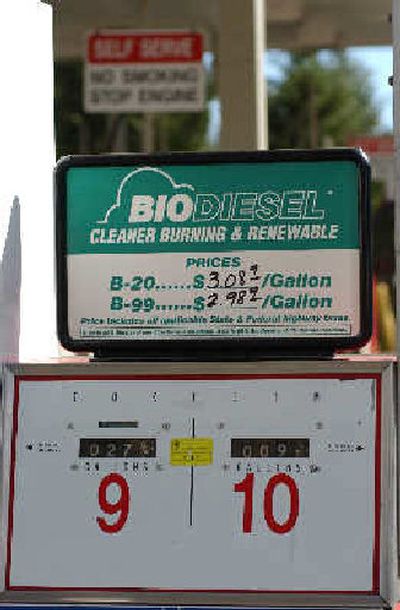Measure may fuel biodiesel production

OLYMPIA – Washington state’s nascent oilseed industry would get an immediate $9 million boost under a package of emergency loans approved by the state House on Monday.
The money would fund four proposed crushing plants in Eastern Washington, where canola and other crops could be reduced to oil. The oil would later be blended with diesel fuel to create a biodiesel mix.
The Spokane Conservation District, the Odessa Public Development Authority and the Port of Columbia County each would get $2.75 million under the proposal. The Port of Sunnyside would get $750,000.
Supporters believe the crushers will help Washington leap ahead in production of both oilseeds and biodiesel, which burns cleaner than conventional diesel.
“A hundred years from now, it won’t be oil that runs our economy. It will be something else,” said Rep. Hans Dunshee, D-Snohomish. “Change is required – not by some hug-a-tree, granola kind of stuff, but by the simple realities of supply and demand.”
The measure, part of a major movement to encourage biofuels production, passed the House on an 89-7 vote. It now heads to the state Senate for consideration.
Majority Democrats turned aside several proposed amendments before voting on the bill, including an attempt to strip prevailing wage requirements for the crushing plants.
Republicans also worried that the bill’s four earmarked projects would get an advantage over private-sector attempts to build similar facilities.
“We will cut the legs out from under those who are trying to do this in the private sector and do it in a market-driven manner,” said Rep. Ed Orcutt, R-Carrolls.
Under Dunshee’s bill, the state would sell bonds to raise cash. Government subdivisions would get the money as low-interest loans, and private companies would have to match half the state subsidy to help pay startup costs.
Canola is seen as the leading candidate to supply the crushing plants, but Washington state farmers grow only about 4,000 acres of it, said Terry Morgan, a Rosalia farmer and vice chairman of the state Canola Commission.
That’s a pittance compared to leading states such as North Dakota, which planted about 1 million acres last year. But good prices and steady demand in Washington could help change that, Morgan said. “With winter canola, with some of the yields that are available, it will be very competitive or outperform wheat,” he said. “It won’t replace wheat by any means, but it can replace a portion of it in the rotation.”